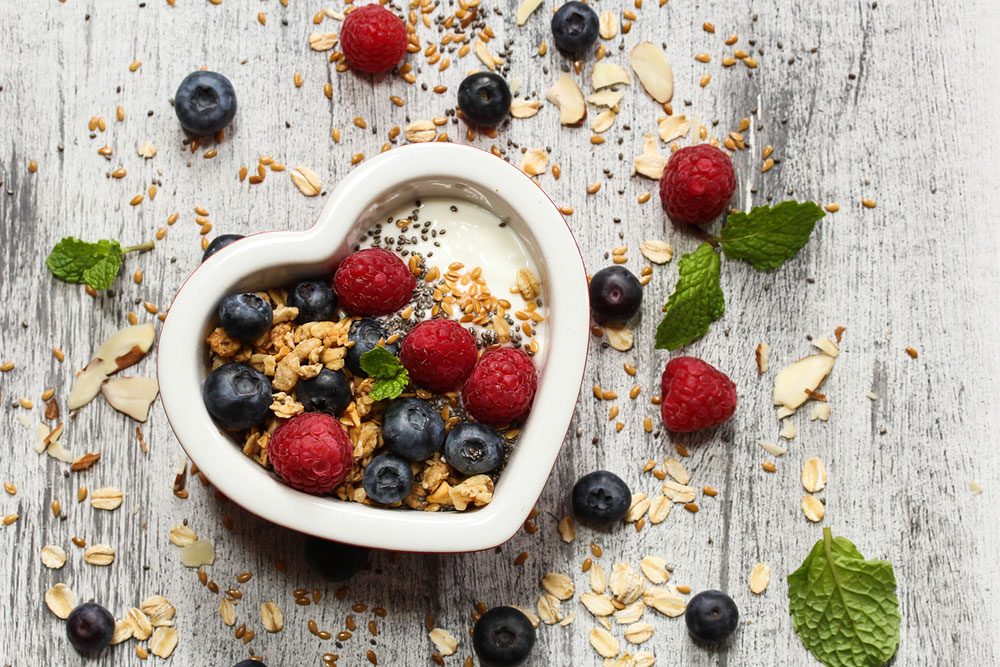
7 heart-healthy breakfast ideas to start the day right
Breakfast is considered the most important meal of the day. It kickstarts the body’s metabolism, supplies essential nutrients for organs, and provides energy for the tasks ahead. Individuals with cardiovascular health conditions are especially advised to be mindful of what they eat for breakfast and pick nutritious foods. This comprehensive guide explores a few heart-healthy breakfast ideas one can consider. It also explains the benefits of each recipe to help make informed choices.
Oatmeal with berries
Oatmeal is a heart-healthy breakfast superstar that is easy to prepare and digest. It is rich in fiber, which helps manage cholesterol levels in the bloodstream, lowering heart disease risk. Cook the oats with almond milk until creamy, add some fresh berries, and top it off with chia seeds.
Oats contain beta-glucans, a soluble fiber that reduces LDL (low-density lipoprotein) cholesterol or “bad” cholesterol. Berries are loaded with rich antioxidants that actively combat oxidative stress and inflammation—risk factors linked to heart disease. Chia seeds additionally provide omega-3 fatty acids known to contain anti-inflammatory properties that support heart health.
Avocado toast
Avocado toast has gained popularity for good reasons. Avocado is a nutritious fruit with healthy fats that help lower bad cholesterol. This recipe needs the most basic ingredients, such as a couple of whole-grain bread slices, a fresh ripe avocado, lemon juice, and red pepper flakes to add some heat. Mash the avocado with lemon juice, spread it over a whole-grain toast, and sprinkle red pepper flakes. Voila! It is that easy to prepare.
Avocado is full of monounsaturated fats, which can reduce LDL cholesterol levels. It is also a good source of potassium that helps regulate blood pressure. Whole-grain bread provides fiber that helps with digestion to control cholesterol levels further.
Greek yogurt parfait
Dessert for breakfast may sound odd. But this healthy dessert-ish recipe boasts some of the best nutrients and vitamins that, when combined, lower the risk of heart disease. The recipe involves layering Greek yogurt, fresh fruit (can be slices of kiwi or assorted berries), some honey, and a handful of almonds in a cup and refrigerating it.
Greek yogurt is a good source of protein and healthy probiotics that promote cardiovascular function. The probiotics in yogurt support a healthy gut microbiome, also linked to improving heart health. Adding fresh fruit boosts antioxidant intake, protecting organs against inflammatory flare-ups. Further, assorted nuts and seeds like almonds provide unsaturated fats to improve and better manage cholesterol levels.
Veggie omelet
Eggs are among the most versatile foods; they can be poached, boiled, or even fried. However, nothing beats the classic omelet for breakfast. When combined with veggies, eggs create a heart-healthy meal that is filling and easy to digest while ensuring satiation for a longer duration. This recipe calls for eggs, diced bell peppers, chopped spinach, onions, tomatoes, and a sprinkle of feta cheese to top off the omelet. Whisk the eggs and pour them into a hot pan with sautéed vegetables. Then sprinkle with feta cheese and cook until set.
Eggs are known to be a good source of high-quality protein, which supports muscle health and growth. Bell peppers, spinach, onions, and tomatoes provide vitamins, minerals, and antioxidants. The fiber in vegetables aids in digestion and helps control cholesterol levels. Feta cheese adds calcium, which is essential for heart muscle function.
Chia seed pudding
Chia seeds are tiny powerhouses of nutrition. When soaked in milk, they assume a pudding-like texture that’s perfect for making a healthy bowl of breakfast for heart patients. This recipe only needs chia seeds, almond milk, honey or maple syrup, and sliced bananas. Mix the chia seeds base with almond milk and sweetener. Let it sit in the refrigerator until it thickens. Once thick, top it off with banana slices and add a small amount of honey or maple syrup. Avoid refined sugar condiments at all costs.
Chia seeds are a rich in omega-3 fats that help lower inflammation and support heart health. They also have fiber, which aids in digestion and helps regulate blood sugar levels. Additionally, bananas provide potassium to help maintain healthy blood pressure.
Whole-grain pancakes
Pancakes are a homemade staple and a preferred option for a heart-healthy breakfast. But consider using whole-grain pancakes instead of the traditional white flour ones. The basic ingredients for this recipe include store-bought whole-grain pancake mix, some fresh berries, and a dollop of Greek yogurt. Prepare whole-grain pancakes per the package instructions and top them with berries and Greek yogurt.
Whole grains are rich in fiber, vitamins, and minerals that promote cardiovascular health. Assorted berries have antioxidants that protect against heart disease. Greek yogurt provides protein, which supports satiety and muscle health.
Smoothie bowl
Smoothies are not only visually appealing but also heart-healthy. They are great breakfast options for vegetarians, easy to make and digest. The ingredients include fresh spinach, frozen berries, banana, Greek yogurt, and natural honey. Consider granola or almonds to add that extra bit of crunch. Simply blend the ingredients until smooth, pour the mix into a bowl, and top with granola and sliced almonds.
Leafy greens like spinach provide essential vitamins, minerals, and antioxidants that boost cardiovascular health and immunity. Fresh fruits, including berries and bananas, add vitamins, fiber, and natural sweetness. The Greek yogurt contains probiotics for gut health. Granola and almonds provide additional protein and healthy fats.
A heart-healthy breakfast doesn’t have to be plain. From oatmeal to smoothie bowls, each breakfast idea offers unique benefits, including reduced cholesterol levels, blood pressure control, and improved overall heart health. By incorporating these delicious and nutritious breakfast ideas into one’s morning routine, it’s possible to promote cardiovascular well-being. So, start the day right with these breakfast choices and enjoy a better outlook in the long run. Remember, a healthy heart begins with a healthy breakfast!


